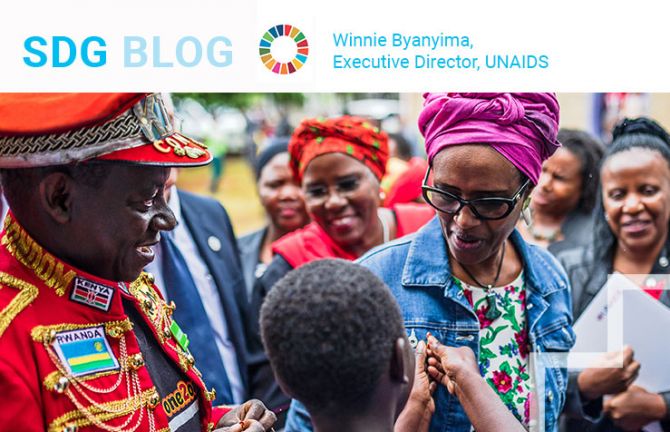

Opinion
We must act together to beat COVID-19 in Africa
03 May 2020
03 May 2020 03 May 2020The COVID-19 outbreak has been placing unprecedented strains on sophisticated health systems in Europe and Asia, with overstretched medical staff struggling to treat their patients and intensive care facilities overwhelmed in rich countries. With cases rising in Africa, concerns are increasing on the impact on fragile health systems there. This crisis is already exposing glaring inequalities between the rich and the poor in the developed world, and it is about to reflect even greater inequalities between the North and the South.
This health crisis, like others, is hitting the poorest and the most vulnerable the hardest, especially in Africa. What does social distancing mean in Africa’s congested townships, its packed markets and buses. How will people wash their hands several times a day to protect themselves from the virus without having access to water and basic sanitation? And what does that mean for women and girls who bear the daily burden of hauling water from rivers and wells for their households? How will a mother choose between going to work to put food on the table or staying at home with a cough or a fever? How do we tell informal workers, taxi drivers and all those who operate in the platform economy and live hand-to-mouth not to go to work?
We need to act now! There are four things we must do urgently: scale up testing and isolate infected people and communities, invest in health and protect our healthcare workers, focus on the community to ensure that the community response is strong, and have a constant supply chain.
The Africa Centre for Disease Control and Prevention estimates that 10 million testing kits will be necessary to respond to COVID-19 effectively over the next three months. Hundreds of millions of personal protective items such as face masks, protective gowns and gloves will also be needed. At a time when there is a global demand for these medical supplies, Africa must not be left behind. As we have seen in other countries, the best way to reduce infections and deaths is to test, treat and isolate infected people and communities to contain the virus. So, the supply of testing equipment and access to testing must be the priority.
A lack of investment in Africa’s social infrastructure, including in its health systems, mounting debt and massive corporate tax dodging has left the continent ill-prepared to face this coming emergency. Without publicly provided health care, people are left exposed to disease. User fees for accessing health services deny ordinary people their right to health. This is the time to abolish them. Rich countries are rightly pumping billions of dollars into their own economies and social security systems to keep people and businesses afloat, but will there be massive coordinated international financial support for the developing countries to fight Covid-19? We are in this together. Nothing but a global response will defeat this aggressive virus.
In responding to the HIV epidemic, community-led services have been core to our most important advances in preventing new infections and getting people on treatment. In the response to COVID-19, communities will no doubt step into the breach and public health authorities must engage with them now and build trust for the upcoming battle. We will not win without communities. It is communities who will design and implement their own context specific prevention measures, in markets, in buses, at funerals. As we have seen in the AIDS response, it will most often be women who will lead the charge in terms of caring for the sick and making sure that their children and communities are as safe as possible. We must ensure that resources flow to them so that they can carry on their important work, that they are fairly compensated and that their families are financially secure.
And the response must respect the human rights of the most vulnerable. There have already been incidents all over the world where individuals or communities are being blamed for the virus. This must stop. It’s wrong and counter-productive for the wider public good. Let us learn the lessons of the AIDS response and know that stigma and discrimination will hold us back in getting to grips with this pandemic.
In addition, to make sure that medicines continue to reach people in need, we must ensure the security of the global supply chain in this period. UNAIDS is working closely with all its partners to make sure that essential medicines and medical supplies continue to get to where they are most needed. We will continue to do so.
I wish we were in a different place. That everyone had the right to health and that we were in a stronger position to face this new challenge. That debate will continue and my voice will stay strong. For now, we must do the best we can for our communities.
Let us help and support each other during this time – we are all in this together and we will beat this virus through solidarity, compassion, and kindness.
Winnie Byanyima, UNAIDS Executive Director
UNAIDS
The Joint United Nations Programme on HIV/AIDS (UNAIDS) leads and inspires the world to achieve its shared vision of zero new HIV infections, zero discrimination and zero AIDS-related deaths. UNAIDS unites the efforts of 11 UN organizations—UNHCR, UNICEF, WFP, UNDP, UNFPA, UNODC, UN Women, ILO, UNESCO, WHO and the World Bank—and works closely with global and national partners towards ending the AIDS epidemic by 2030 as part of the Sustainable Development Goals. Learn more at unaids.org and connect with us on Facebook, Twitter, Instagram and YouTube.



